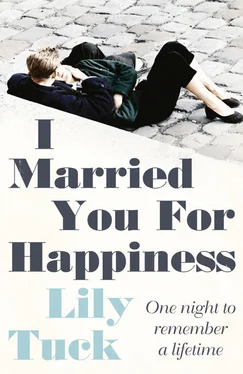He won’t mind, she thinks.
“In general,” Philip might say, were he to turn her infidelity into a classroom exercise, “if we know for certain that my wife is not having an affair, the probability of the event would be 0; but, should we discover that she is having an affair, the probability would be 1. The numerical measure of probability can range from 0 to 1—from impossibility to certainty. Thus, the probability of my wife being unfaithful would be 1 over 2 because there are only the two possibilities: that she is having an affair or that she is not having an affair.”
While she and Jean-Marc are in bed one afternoon, someone knocks at the front door and calls out Nina’s name—the landlady checking on the new refrigerator or leaving her some fresh lettuce from her garden.
Un moment, Nina calls back down. J’arrive.
Only half dressed and holding his shoes in one hand, Jean-Marc climbs out the bedroom window. Jumping, he lands squarely on his feet. In another moment, he leaps over the hydrangea hedge and is gone.
Jean-Marc has the tight, muscular body of a gymnast.
“But let us take another example,” Philip continues. “The probability of a person crossing a street safely is also 1 over 2 because again there are only two possible outcomes: crossing safely and not crossing safely. Yet the trouble with this argument is that the two possible outcomes—crossing safely and getting run over—are not equally likely. If they were, people would not want to cross the street very often or if they did, a lot of them would get hurt or killed. So therein lies the fallacy. The definition given by Fermat and Pascal applies only if one can analyze the situation into equally likely possible outcomes, which takes me back to my original example—and to put your minds at ease”—a few of the students laugh—“since I know my wife to be a truthful and loving woman, she is not likely to be unfaithful and to have had an affair.”
General laughter and applause.
Trust is a word we have put too much trust in, Philip also tells his class.
Iris again.
Was Iris, like Philip, a native of Wisconsin? A blonde beauty of Scandinavian origin—her hair so blonde it is white. And a musical prodigy. Nina has read about children who learn how to play the piano at age three, compose their first piece at five, debut as a soloist at seven—was Iris one of them? She pictures her sitting, small and demure, a bow in her hair, on the piano bench in front of the Steinway grand, her feet reaching for the pedals as she starts to play. Her little hands move swiftly and assuredly; the sound she makes is passionate. She plays Philip’s favorite Chopin polonaise—Nina can hear the melody in her head—which promises redemption and celebrates Polish heroism. Were they high school sweethearts and did they sleep together? Perhaps Iris is pregnant and she has just found out. Twice she has missed her period and every morning now she throws up her breakfast. She has screwed up her courage to tell Philip in the car on the way home from the party. The reason he drives off the road.
Nina leans over Philip. Lightly, she touches his cheek. How can this have happened? How can this be?
Philip is so robust, so healthy, so—she tries to think of the right words—so engaged in life.
Come back, she whispers. Please, come back.
How can he leave her?
Without saying good-bye.
Without a word.
Please, she pleads.
Putting her head down on his chest, she listens.
At home, some evenings, Philip likes to play music and take her in his arms and whirl her in a quick two-step to La vie en rose, down the front hall, past the umbrella stand, the closet full of coats and past the pastel of a ship, its prow shaped like the head of a dog.
The top of her head reaches his collarbone, she can feel his heart beating.
His shoes are on the floor next to the bed. Old-fashioned, scuffed-up, lace-up brown oxfords. One shoe is lying on its side. Abandoned. Should she pick up the shoes and put them away in the closet? No, she will leave them there.
She picks up after Philip. It annoys her—no, worse: it angers her. His socks, his underwear, left lying around for her to put away, to hang up, to throw in the laundry basket. At first, she scolds but then bored by her own aggrieved tone and the futility of her words, she stops.
Untidiness in a man, she has read somewhere, is a sign of his having had a mother who dotes and spoils her son. Not so, in Philip’s case.
Alice, Philip’s mother, lives twenty miles away in a nursing home. The last time Nina and Philip visit her, Alice is not certain who they are. Unfailingly polite, she speaks about people Nina has never heard of: Rick who built a fireplace made out of bricks—Rick rhymes with brick—nonsense. Nina lets her mind wander. She has brought tulips from the garden, which pleases Philip’s mother.
I’ve always loved bougainvillea, she tells Nina.
Tulips, Mother, Philip tries to correct her. Tulips from our garden.
Francis, my husband, loved bougainvillea, Alice continues. Our garden in Ouro Prêto was full of bougainvillea.
Конец ознакомительного фрагмента.
Текст предоставлен ООО «ЛитРес».
Прочитайте эту книгу целиком, купив полную легальную версию на ЛитРес.
Безопасно оплатить книгу можно банковской картой Visa, MasterCard, Maestro, со счета мобильного телефона, с платежного терминала, в салоне МТС или Связной, через PayPal, WebMoney, Яндекс.Деньги, QIWI Кошелек, бонусными картами или другим удобным Вам способом.












